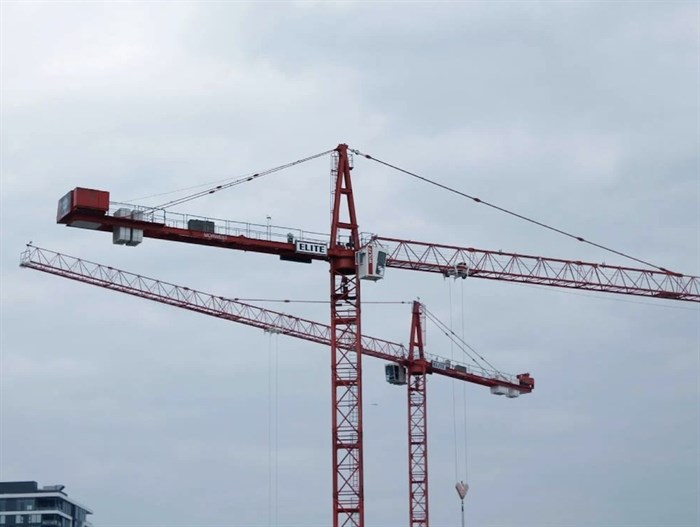
Six people have died in BC crane accidents since 2021 and there have been three incidents in the last month.
Image Credit: Photo for The Tyee by Zak Vescera
March 01, 2024 - 6:00 PM
B.C. government officials and industry stakeholders will meet to discuss regulatory changes two weeks after a woman was killed by a falling load from a tower crane in Vancouver on Feb. 21.
But union leaders say the meeting next week isn’t related to the death at the Oakridge Park development and no new urgent safety measures are on the table.
In a statement, Labour Minister Harry Bains said “BC Crane Safety is pulling together industry, WorkSafeBC and union representatives for a meeting next week to discuss recent events, including assembly and disassembly of cranes.”
But Josh Towsley, a representative of International Union of Operating Engineers Local 115, said the meeting next week isn’t to discuss recent events.
“That meeting is to talk about the regulation changes that were already in order prior to these latest three incidents,” he said.
On Feb. 21, a worker was killed while working on the Oakridge construction site when a crane’s load fell on her. This was the third crane accident in B.C. in the last month, after the boom of a crane collapsed in Surrey and part of a crane boom was left hanging over a highway in Burnaby due to a technical failure in January.
It’s also the sixth tower crane-related death in B.C. over the last three years, following five deaths in Kelowna in 2021 when a crane collapsed and killed four construction workers and one office worker.
Two years after that incident, RCMP have recommended one charge of criminal negligence causing death.
Towsley said the meeting next week is to discuss a proposal put forth by WorkSafeBC in response to the Kelowna incident nearly three years ago.
“My understanding is it’s not about changes related to the three recent incidents… those changes are really around how much notice WorkSafe gets before a tower crane is erected or dismantled, and disclosure of who’s on the crew,” he said.
Bains said the change was first proposed by WorkSafeBC in July and would “require employers to submit a notice of tower crane assembly, disassembly and repositioning.” A decision on whether to adopt it will be made this spring, he said.
Towsley said what’s not on the agenda for next week’s meeting are changes the union has been calling for years, including mandatory licensing of contractors that assemble and disassemble tower cranes and required training levels for those who do the work.
Brynn Bourke, executive director of BC Building Trades, said the government has been working over the past few years to bring back “a regulated trades training system” after trades certification requirements were altered by the BC Liberal government two decades ago.
In 2022 the NDP made certification mandatory for 10 types of mechanical, electrical and automotive trades workers.
Bourke, whose organization is an umbrella group for trade unions, says tower crane operators and iron workers are among those shortlisted by SkilledTradesBC to be included in the next round of trades to require mandatory training.
“We have been active in assisting in those applications, co-ordinating the union involvement on that and would like to see that process happen much more quickly than it has been playing out,” Bourke said.
In the absence of training requirements for people working on assembling and disassembling tower cranes, Towsley said the union decided to create its own program in the aftermath of the Kelowna deaths.
“We, as a union, went out and spent $2 million to purchase two new tower cranes — one being one that’s fixed in place on a foundation, the other one being self-erected [and] has some ability to move,” Towsley said. “We’re in the process of developing curriculum and making sure that we can train to the highest standard possible.”
Bains pointed to the WorkSafeBC proposal of requiring more notice from contractors when tower cranes are being used, as a measure — yet to be approved and put into practice — taken in response to the Kelowna incident.
However, industry stakeholders say a broader approach is needed to prevent accidents.
“These crane accidents, each one being a bit different, require a whole-of-industry approach and it’s not going to be one thing that’s going to make people safer,” Bourke said.
“We have so many members who work at Oakridge, who were on site, who were nearby, that are connected to this and it’s just the worst days of your career, the days where you have workers die,” Bourke said.
“We really should have come out of Kelowna with a determination to be leaders in tower crane safety in the province of British Columbia, and we missed that opportunity and we can’t miss this one,” Towsley said.
Bains said the Labour Ministry will keep talking to unions and WorkSafeBC to plan safety improvements for construction workers.
— This story was originally published by The Tyee.
News from © iNFOnews, 2024